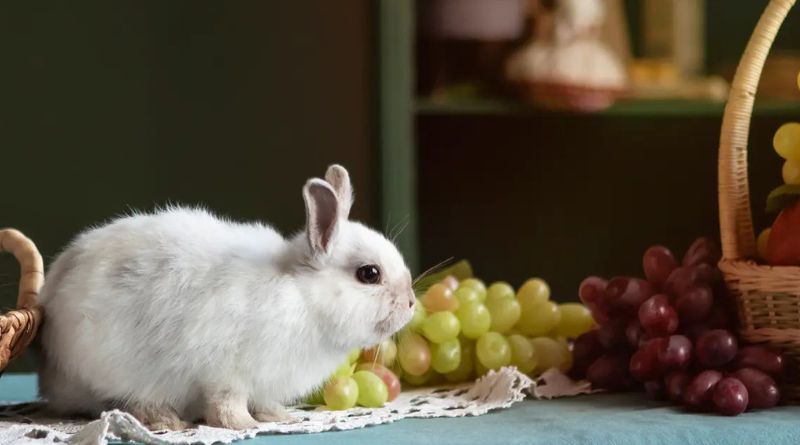
As a rabbit owner, one of your primary concerns is ensuring your pet stays healthy and happy. This often involves feeding them a balanced diet that includes plenty of fresh vegetables, hay, and the occasional treat. But when it comes to fruits like grapes, many rabbit owners wonder if they are safe for their furry friends. Can rabbits eat grapes? The short answer is yes, but with important considerations. In this article, we will explore whether grapes are a good treat for rabbits, the potential health risks, and how to incorporate them safely into your rabbit’s diet. We’ll also answer some frequently asked questions to help you make informed decisions about feeding grapes to your rabbit.
Table of Contents
The Basics of a Rabbit’s Diet
Rabbits are herbivores, meaning they thrive on a plant-based diet. Their natural diet in the wild consists mainly of grass, leafy greens, and some fruits. However, domesticated rabbits require a slightly different diet to ensure they get the necessary nutrients. A healthy rabbit diet should consist of the following:
- Hay: Hay is the most essential component of a rabbit’s diet, providing fiber to aid digestion and keep their teeth healthy. The best types of hay for rabbits include timothy hay, meadow hay, and orchard grass.
- Fresh Vegetables: Leafy greens like kale, parsley, dandelion greens, and romaine lettuce are ideal. Rabbits can also eat other vegetables like carrots and bell peppers, but these should be offered in moderation.
- Pellets: High-quality rabbit pellets can supplement their diet, but they should be given in small amounts as a supplement to hay and vegetables.
- Fresh Water: Constant access to fresh water is essential for your rabbit’s health.
Fruits like apples, bananas, and grapes are generally considered occasional treats and should be fed in moderation due to their high sugar content.
Can Rabbits Eat Grapes?
Now that we’ve covered the basics of a rabbit’s diet, let’s focus on grapes specifically. Grapes, both red and green, are not toxic to rabbits, and they can technically be eaten in small amounts. However, there are several important factors to consider before offering grapes to your rabbit.
Nutritional Value of Grapes for Rabbits
Grapes contain several vitamins and minerals, including Vitamin C, potassium, and antioxidants, which can provide some health benefits to rabbits in small amounts. They are also a good source of hydration due to their high water content. However, grapes also contain a lot of sugar, which can be harmful to rabbits if consumed in excess.
- Sugar Content: Grapes are high in natural sugars, which, if fed in excess, can lead to obesity, digestive problems, and even more severe conditions like diabetes. Rabbits are sensitive to sugar, so fruits should always be considered as an occasional treat, not a staple of their diet.
- Fiber: Unlike leafy greens and hay, grapes do not provide much fiber, which is essential for maintaining healthy digestion in rabbits.
- Hydration: The water content in grapes can help keep your rabbit hydrated, but it’s important to note that fresh water should still be the primary source of hydration.
Risks of Feeding Grapes to Rabbits
While grapes themselves are not toxic to rabbits, there are some potential risks associated with feeding them to your pet:
- Digestive Issues: Rabbits have sensitive digestive systems, and consuming too many sugary fruits like grapes can cause diarrhea, gas, or bloating. Rabbits are also prone to gut stasis, a condition where their digestive system slows down or stops completely. Overfeeding sugary fruits can contribute to this condition, which can be life-threatening if not treated quickly.
- Obesity and Diabetes: Due to their high sugar content, grapes can contribute to obesity if fed in large amounts. Rabbits that are overweight may have trouble moving around, suffer from joint issues, and be at higher risk for other health problems. Additionally, excessive sugar intake over time can increase the risk of developing diabetes in rabbits.
- Choking Hazard: Grapes are small and easy to swallow, but if not cut into smaller pieces, they can pose a choking hazard, especially for smaller rabbits or those that are overly excited during feeding.
- Pesticides: Grapes, especially non-organic ones, can be treated with pesticides, which can be harmful to your rabbit if consumed. Always wash grapes thoroughly before offering them to your rabbit, or, even better, buy organic grapes to reduce the risk of pesticide ingestion.
How to Safely Feed Grapes to Your Rabbit
If you decide to give grapes to your rabbit as a treat, it’s important to do so in moderation and follow some basic guidelines to ensure your pet’s safety:
- Offer Grapes as an Occasional Treat: Grapes should never make up more than 10% of your rabbit’s diet. They should be considered a treat and offered in small amounts (1 or 2 grapes) a few times per week, not a daily snack.
- Wash Grapes Thoroughly: Before offering grapes to your rabbit, wash them thoroughly to remove any pesticides or chemicals. This is particularly important if you’re not using organic grapes.
- Cut Grapes into Small Pieces: To avoid the risk of choking, cut grapes into small pieces before feeding them to your rabbit. This will make it easier for them to chew and digest the fruit safely.
- Monitor for Negative Reactions: After feeding your rabbit grapes for the first time, observe them for any signs of digestive upset, such as diarrhea, bloating, or lethargy. If your rabbit shows any negative symptoms, discontinue feeding them grapes and consult your veterinarian.
- Remove Seeds and Stems: If you’re feeding grapes with seeds, be sure to remove them first, as they could pose a choking hazard. Although grape seeds are not toxic to rabbits, it’s best to be cautious.
Alternatives to Grapes for Rabbits
If you’re concerned about the sugar content in grapes or want to offer your rabbit a healthier alternative, there are several other fruits and vegetables that can make great treats:
- Apples (without seeds)
- Strawberries
- Bananas (in small amounts)
- Pineapple (fresh and in moderation)
- Carrots (a great low-sugar treat)
- Blueberries
- Pear (without seeds)
- Raspberries
- Leafy greens like dandelion greens, kale, and parsley
FAQs
1. Are grapes safe for rabbits to eat every day?
No, grapes should only be fed to rabbits as an occasional treat due to their high sugar content. Overfeeding grapes can lead to digestive problems and obesity. Aim for a small piece once or twice a week.
2. Can baby rabbits eat grapes?
Baby rabbits (or kits) should be fed a diet primarily consisting of hay and their mother’s milk for the first few weeks of life. Once they are old enough to start eating solid foods (around 8 weeks), you can introduce small amounts of fruits like grapes, but only sparingly and in small portions.
3. Can grapes cause diarrhea in rabbits?
Yes, if consumed in excess, grapes can cause digestive upset, including diarrhea. It’s important to only offer grapes as a treat in small quantities and monitor your rabbit’s reaction.
4. Can I feed raisins to my rabbit?
While raisins are dried grapes, they are even more concentrated in sugar and should be avoided. The high sugar content in raisins can be harmful to rabbits and may lead to health problems like obesity and digestive issues.
5. How can I tell if my rabbit is having a bad reaction to grapes?
If your rabbit is having a negative reaction to grapes, you may notice signs of diarrhea, lethargy, bloating, or a lack of appetite. If you see any of these symptoms, remove grapes from their diet and consult your veterinarian for advice.
Conclusion
In conclusion, rabbits can eat grapes, but they should only be offered occasionally and in moderation. Grapes are high in sugar, and excessive consumption can lead to serious health issues like obesity, diabetes, and digestive problems. Always wash grapes thoroughly, cut them into small pieces, and monitor your rabbit for any negative reactions. By offering a variety of healthy foods and treats, you can ensure your rabbit remains happy, healthy, and well-fed.






